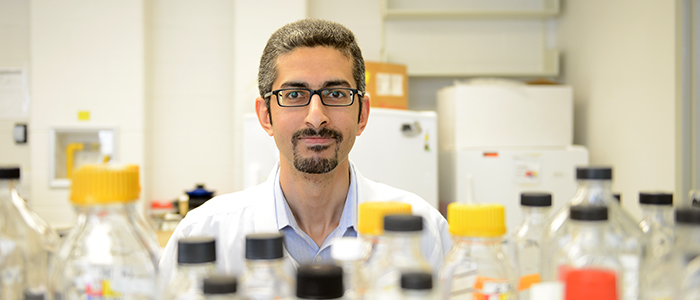Like something out of a science fiction movie

Superbugs. Bacteria communicating with one another. A post-antibiotic era.
This might sound like the recipe for a successful science fiction blockbuster film, but it’s not. It’s what Omar El-Halfawy, PhD, focuses on every day in Dr. Miguel Valvano’s lab at Schulich Medicine & Dentistry — and there’s nothing fictional about it.
According to the World Health Organization, a post-antibiotic era, in which common infections and minor injuries can be fatal, is far from being an apocalyptic fantasy. Instead, it’s a very real possibility for the 21st century.
El-Halfawy is interested in finding out how certain bacteria resist antibiotics and discovering new treatments to tackle this global issue.
“The discovery of antibiotics, which was made close to 100 years ago, is considered one of the most significant discoveries in history because it enabled people to have this kind of mass advancement in medicine,” El-Halfawy said. “People take this for granted and don’t appreciate what we have, and now we are at a risk of losing it all if we do not address the problem by doing serious research.”
Dr. Valvano’s lab, where El-Halfawy is completing a postdoctoral fellowship, focuses on Burkholderia cenocepacia, bacteria that is extremely resistant to antibiotics and causes serious problems in immunocompromised patients, like those with cystic fibrosis. El-Halfawy’s research is looking into how this specific superbug communicates its extraordinary antimicrobial resistance to other, often less harmful bacteria.
During his PhD training, El-Halfawy showed a new interaction between bacteria related to antibiotic resistance. He found that Burkholderia cenocepacia could protect other bacteria that could normally be treated with antibiotics.
“The superbug would send signals, small proteins and small chemicals, to other bacteria and I characterized this information,” he explained. "In doing so, I found a new mechanism of antibiotic resistance, which is what I have continued working on into my postdoctoral fellowship.”
El-Halfawy added this finding is not specific to Burkholderia cenocepacia — they tested other bacteria and they all shared the protein that displayed this mechanism of resistance.
Originally from Alexandria, Egypt, El-Halfawy got his start in pharmaceutical sciences. After working as a community pharmacist for a few months, he joined the Department of Pharmaceutical Microbiology at the University of Alexandria as a faculty member.
He came to Canada with his wife and six-year-old daughter in 2010, and has been completing his training and fellowship position since then.
“Of course coming here was a big transition, a big shift, but I felt that the lab and Schulich Medicine & Dentistry was very welcoming,” he said. “From the beginning, it felt like home — the transition was very smooth, and there were plenty of international trainees working around me.”
While he enjoys the independence and focus on research that comes from completing a postdoctoral fellowship, he looks forward to being able to teach again.
“Since the beginning of my career in academia, I’ve always had the opportunity to teach,” he said. “I think the interaction with students is rewarding and fun, and I look forward to doing it again in the future.”








